Coordination
Background
Effective coordination can prevent gaps and overlaps in humanitarian responses, ensure the impact of CVA is optimised for the benefit of crisis affected populations, whilst also making the most of limited humanitarian funding. But the CALP Network’s State of the World’s Cash report found that cash coordination is seen as weak and ad hoc, and that this is having serious operational impact.
Ninety-five donors, international and national NGOs, private sector actors and one UN agency have called for clarity on two key issues surrounding cash coordination:
- Who should be accountable for ensuring effective cash coordination, and
- What the scope of Cash Working Groups should be, including in relation to multipurpose cash.
We urgently need to build on what works and provide clarity at the global level on the questions above, whilst adapting to different contexts. Clear decisions based on the impact on affected populations rather than agency politics are long overdue.
Current priorities
We aim to contribute to progress on this issue on three levels: supporting Cash Working Groups at the regional level; contributing to practical solutions for cash coordination at the global level; and convening evidence-based discussion on the key issues, highlighting critical decision points and opportunities for progress.
Featured content

Cash Coordination – LIVE timeline
Page
The latest updates on cash coordination as they unfold.

95 Organisations Sign Letter Calling for Strengthened Cash Coordination
News
Today a letter signed by 95 organisations was handed into the Emergency Relief Coordinator (ERC) urging the Inter-Agency Standing Committee (IASC) to take a decision on the leadership and scope of cash coordination in the coming year.

Is cash transforming the humanitarian system or is the system limiting how cash is used?
Blog Post
At the State of World’s Cash 2020 launch event, Sorcha O’Callaghan, Director of Humanitarian Policy Group at ODI warned that, “Cash offers a huge transformative potential, but as far as the system is privileging the interest of the agencies over people in crisis, we won’t be able to see it”. If you missed the State of the World's Cash 2020 launch we're sharing highlights. Quote 4...
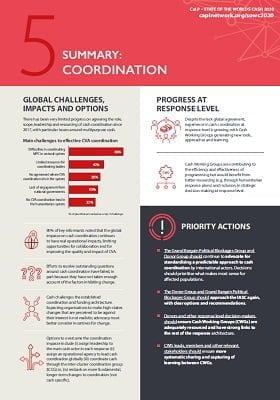
State of the World’s Cash 2020 Chapter 5 summary: Coordination
Report
There has been very limited progress on cash coordination since 2017. Cash continues to challenge the established coordination and funding architecture, and efforts to resolve outstanding questions around cash coordination have failed. Despite the lack of global agreement, Cash Working Groups are pushing forward and contributing to improved programming, and generating new approaches. This...

Cash Coordination Tip Sheet
Guidelines and Tools
This tip sheet sets out established best practice, key guidance and resources for all aspects of cash coordination, intended as a clear, accessible and action-oriented guide for those engaged in coordination of cash and voucher assistance (CVA) at the field level.

Introducing the Cash Coordination Tip Sheet
Webinar
The CALP Network has developed a tipsheet setting out established best practice and key guidance and resources for all aspects of cash coordination, intended as a clear, accessible and action-oriented guide for those engaged in coordination of cash and voucher assistance at the field level.

Cash Coordination: A proposal from members in MENA
Blog Post
Earlier this year the CALP Network undertook regional consultations to explore options for cash coordination. This blog lays out recommendations from participants from the Middle East and North Africa who sketched out what cash coordination, and coordination more broadly, could look like in future to support a more effective, efficient and accountable response.
Thematic lead
Latest
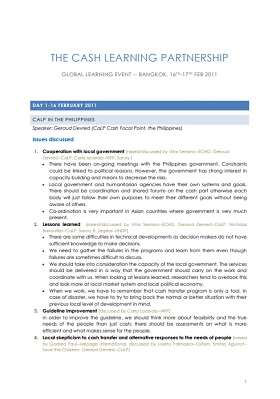
The CALP Network 4th global learning event: Global innovations and lessons learned from response in South and South-East Asia (Complete workshop notes)
Report
The 4th the CALP Network Global Learning Event was held in Bangkok, Thailand on the 16th and 17th February 2011, hosted by the CALP Network in partnership with the International Federation of the Red Cross and Red Crescent Societies (IFRC). This inter-agency event was designed to present the latest...
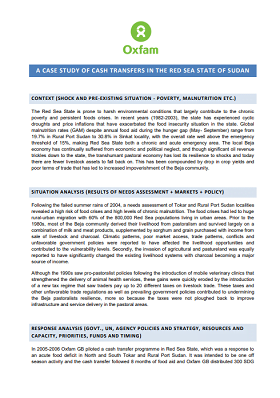
A case study of cash transfers in the Red Sea State of Sudan
Case Study
This case study looks at an Oxfam cash for work and cash for recovery programme in the Red Sea State of North Sudan. The report details the context, the response analysis, programme choice rationale, programme implementation details, the impacts and benefits, and highlights the lessons learned.
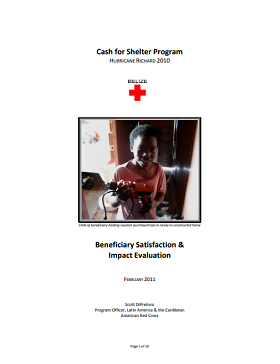
Cash for Shelter Program – Hurricane Richard 2010
Report
A beneficiary satisfaction and impact evaluation of IFRC’s Cash for Shelter Program that ran in response to Hurricane Richard, a category 2 Hurricane Richard that made landfall 20 miles southwest of Belize City on October 24, 2010. The established goal of the BRC program was a faster recovery of the...

Emergency Livelihood Recovery Intervention (ELRI): Fafi District – Garissa County – North Eastern Kenya
Report
The Emergency Livelihood Recovery Intervention (ELRI) was implemented by Horn Relief with funding from OFDA. The Emergency Livelihood Recovery Intervention (ELRI) took place between January 2010 and April 2011; it was designed to address the immediate food security needs of the drought-stricken population...
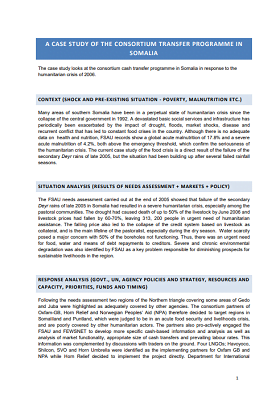
A case study of the consortium transfer programme in Somalia
Case Study
This case study looks at a consortium cash transfer programme in Somalia in response to the humanitarian crisis of 2006. Details of the context, response analysis and rationale for choosing cash for work and direct cash relief interventions are given along with the programme summary. Perceived impacts and...
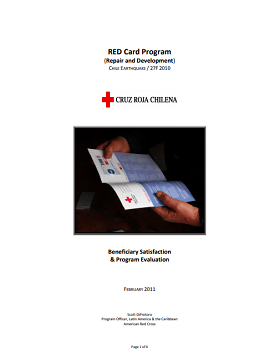
RED Card Program (Repair and Development) Chile Earthquake 2010
Report
On 27 February 2010 an earthquake measuring magnitude 8.8 on the Richter scale struck the Bío-Bío and Maule regions of Chile, at a depth of only 35km. This earthquake was then followed by an equally devastating tsunami. This double disaster left more than 480 people dead, more than 1.8 million people...
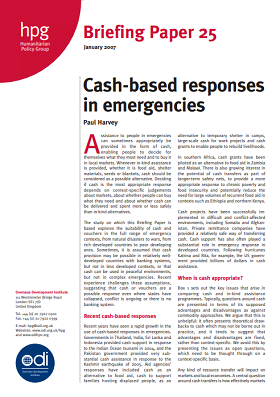
Cash-based Responses in Emergencies
Report
This short HPG briefing paper looks at the suitability of cash based responses in a range of emergency situations. It gives a rapid overview of recent cash based responses and examines the key issues around comparing cash and in-kind programmes. It briefly looks at the impact of cash, the issues of...
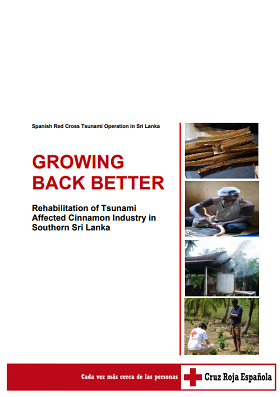
Growing back better: Rehabilitation of tsunami affected cinnamon industry in Southern Sri Lanka
Case Study
This case study looks at the Spanish Red Cross’ intervention in post-tsunami Sri Lanka which aimed at supporting smallholder cinnamon growers, whose fields had been destroyed by the tsunami, to recover and improve their cinnamon production as a way to restore their means of living. Cash grants were...
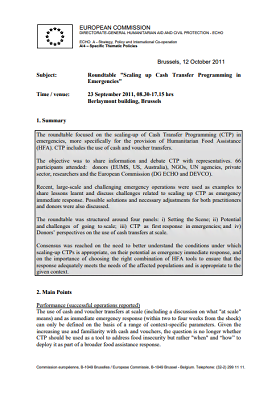
Report: ECHO Roundtable "Scaling Up Cash Transfer Programming in Emergencies"
Report
This 3-page report sums up the main points raised at the ECHO / WFP hosted roundtable on “Scaling Up Cash Transfer Programming in Emergencies”, 23 September 2011. The roundtable focused on the scaling-up of Cash Transfer Programming (CTP) in emergencies, more specifically for the provision of...

Philippines: Cash Vouchers via Debit Cards
Report
This one-page poster provides an overview of ACF’s programme to provide cash vouchers via debit cards in Cotabato City and Sultan Kudarat, Autonomous Regions of Muslim Mindanao, Republic of the Philippines
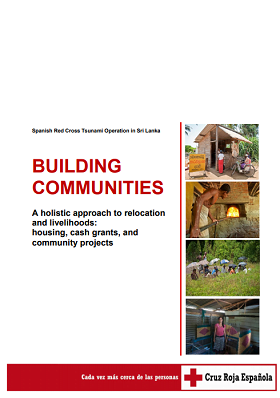
Building Communities: A holistic approach to relocation and livelihoods: housing, cash grants, and community projects
Case Study
This case study looks at the Spanish Red Cross’ housing reconstruction programme which took place between 2007-09 in Sri Lanka, following the devastating Tsunami. In addition to housing this intervention had two main approaches: household level grants for re-starting, supporting the strengthening or...
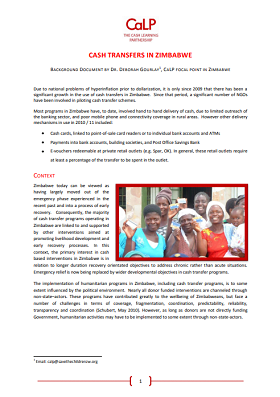
Cash transfers in Zimbabwe
Case Study
A background document to Cash Transfers in Zimbabwe, including details of: Zimbabwe Harmonised Social Cash Transfer (ZHSCT) program UN/World Food Program Cash For Cereals (CFC) program The NGO Joint Initiative (JI) in Zimbabwe Protracted Relief Program (PRP) Independent NGO-led Cash Transfer Programs.
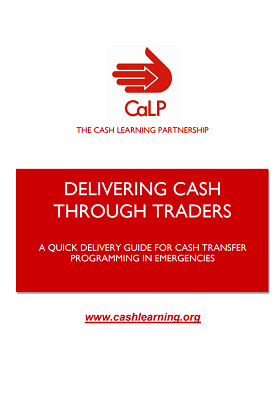
Delivering Cash Through Traders: A quick delivery guide for cash transfer programming in emergencies
Guidelines and Tools
A Quick Delivery Guide to delivering money through local traders. Prepared as a practical tool, this guide provides a brief synthesis of the necessary preconditions and advantages and disadvantages of using cheques. It also provides practical implementation tips.

Water Access by Voucher
Report
This document presents an overview of the use of vouchers to connect vulnerable people in Somalia with water during an emergency response. The document provides thorough and practical guidance to implementing a water voucher programme, covering all phases of the project cycle including: programme...

IASC Evaluation of the Humanitarian Response in South Central Somalia 2005-2010
Case Study
This independent report presented by DARA confirms that humanitarian aid in Somalia has saved thousands of lives between the years 2005 to 2010. The report is based on an evaluation of the humanitarian response in south-central Somalia and is one of the most comprehensive evaluations of aid in Somalia...
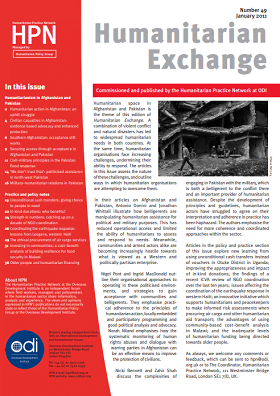
Humanitarian Exchange No. 49: Unconditional cash transfers: Giving choice to people in need
Report
This article in Humanitarian Exchange magazine (article begins on page 19) explains how Action Against Hunger has moved towards unconditional cash grants as a food security and livelihoods response in Northern Uganda. The article describes the technical features of the programme (transfer amount,...
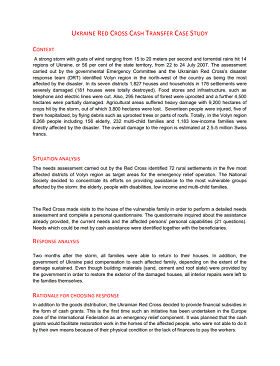
Ukraine Red Cross cash transfer case study
Case Study
This case study examines the first ever Red Cross cash transfer initiative in the European Zone of the International Federation, as part of a home restoration programme in Ukraine following a devastating storm. The report details response analysis, rationale, programme summary, perceived impacts and...
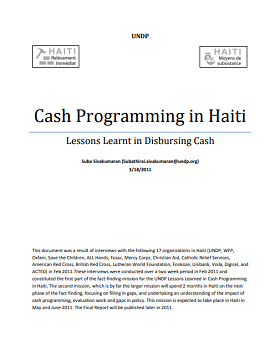
Cash Programming in Haiti – Lessons Learned in Disbursing Cash
Report
The following report is the result of an initial 2 week mission to Haiti to investigate cash programming (including cash for work) amongst 17 organizations. It is not intended as an exhaustive review of 17 organizations’ practices, but attempts to look at what were some of the critical stages in cash...
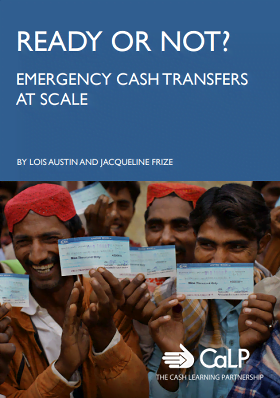
Ready or not? Emergency cash transfers at scale
Report
Whilst there is significant experience of implementing cash transfer programmes (CTP) in emergencies this has seldom been at a scale comparable to in-kind responses. A number of critical gaps and blockages standing in the way of scaled up programming in the wake of a disaster have been identified...

Hard Cash in Hard Times: Cash transfers versus food aid in rural Zimbabwe
Case Study
This case study looks at Concern Worldwide’s pilot project to provide cash, instead of traditional food aid, to food insecure communities in Zimbabwe. The document briefly describes the conditions making it suitable for such a response, positive outcomes for the cash recipients, the cost effectiveness,...



